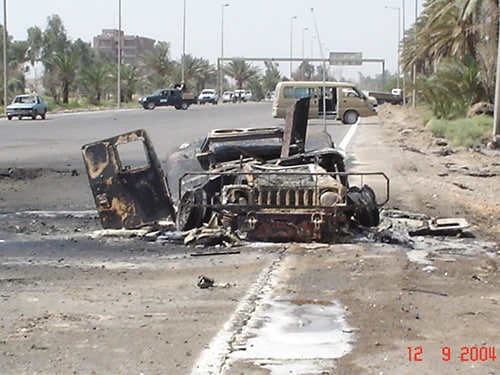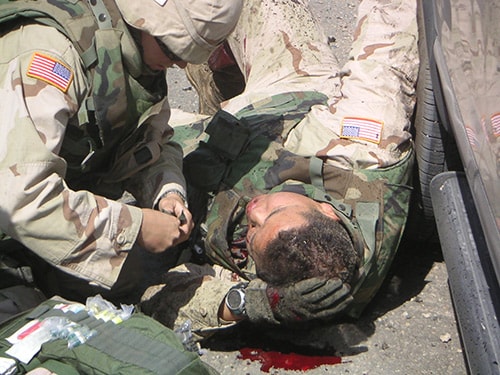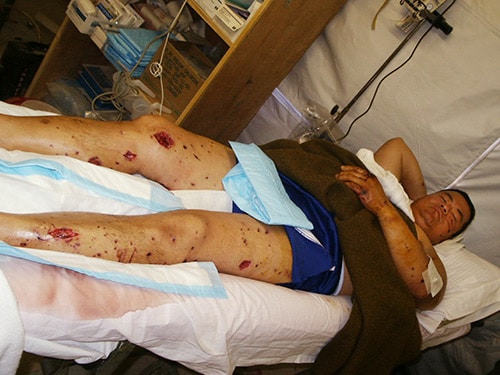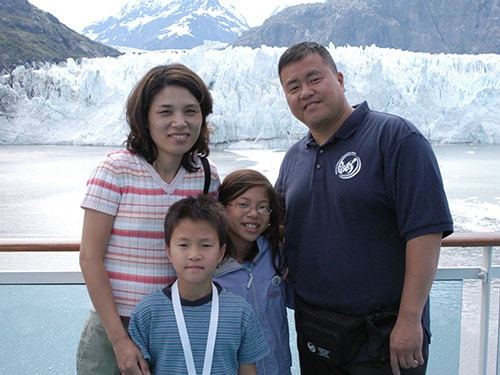Eventually, every doctor becomes a patient. For many physicians, experiencing serious illness and treatment is humbling, eye-opening, and in the end transformative. Dr. Patient is a Medscape series telling these stories.
In 2003, I was called to active duty in the military and, in early 2004, went to Iraq. I commanded a medical unit, running convoys in and out of our base providing medical support.
During one of my missions, our convoy had stopped so a roadside bomb could be cleared. We dismounted and were pulling security when a car with a suicide bomber ran straight into us and blew up.

Luckily, no one died in my unit. But three of us were seriously injured, including myself. I was bombarded with shrapnel, which caused most of my injuries. Some of the major ones impeded my blood flow, damaging my nerves and joints. I was holding a weapon aimed at the vehicle when the explosion happened, so both my thumbs were hyperextended and dislocated. Both my ankles dislocated. I also had a traumatic brain injury and a huge laceration on my head.
I was knocked out, so I don’t remember all this. I’ve pieced the story together through other people and pictures. Iraq was the most photographed war, so there are shots of me being treated in the field.

I had several surgeries in Iraq to remove the biggest pieces of shrapnel. Then I was sent home to Walter Reed Army Medical Center and had additional surgeries over the next four months.

Initially, I was in a wheelchair, and I wasn’t sure if I was going to walk. My nerves were shocked, and nothing was working. Being a spinal cord injury doc, I knew I didn’t have spinal cord damage. It was all peripheral nerves. But I was still aware that I might be in a wheelchair all my life, if things didn’t come back.
Slowly, they did come back. I had to undergo physical and occupational therapy. PT and OT are a mainstay of my job with veterans, and I can tell you, it was the most boring thing I’ve ever had to go through. But boy, was it necessary. Without it, I wouldn’t be where I am today.
“I’m That Guy” — Things Start to Change
After three hours of therapy every day, there was nothing for me to do. So, I went to see the chief of staff at Walter Reed and asked if there was any way he could privilege me. And he did. I got an emergency credentialing privilege. I borrowed a white coat and started seeing patients while being a patient at the same time.
I remember going to the clinic to see a patient. He kept looking at me after I introduced myself. Finally, he said, “You look like the guy that was doing OT next to me yesterday.”
“Oh, yeah, I’m that guy,” I said.
That’s when things started changing for me as a physician. Being there put me inside what my patients were going through. I had learned from textbooks and in the clinic. I had learned from other docs. But after the injury, I was one of these guys.
Now, when my spinal cord patients tell me that PT and OT are boring, I agree with them. I’ve been there. But I tell them, if it wasn’t for that, I wouldn’t be walking.
Physically, I learned how to deal with the pain and everything else. But the mental recovery was really hard. As a physician, and after seeing the things I saw in the war, I didn’t think it would affect me.
When I was in Iraq during the Fallujah offensive, it was nonstop casualties coming in 24/7 for seven days. So many young marines were MEDEVAC to our unit that week, many of whom we could not save. I remember hallucinating because I hadn’t slept. I’ll never forget it. It took a mental toll on many of our medics and physicians.
I couldn’t lose our medics to mental health struggles. I needed them. I used to tell them, “If you bleed every time your patient bleeds, you are going to run out of blood and die. You need to shut that out and move on, because the next patient’s bleeding, and you need to be there to help.”
But after I came back, PTSD hit me hard. Nightmares, flashbacks, anger. It crept up on me. For two years, I had no idea I was suffering through it, and it almost devastated my marriage and my family.
The turning point for me was my daughter who was 10 years old at the time. We were playing some board game, and she put her pieces down and said, “Dad, you don’t smile anymore.” I started crying. I knew I had to get help.

A New Doctor Emerges From the Wreckage
I used to joke with my psychiatrist, “Why am I paying you? All I do is talk, and all you do is nod your head.” He would say, “Ken, would you talk if I didn’t make you?” He was right. I needed to bring it out, and I needed somebody to listen. Now, I fall behind in my schedule because I’m busy listening to my patients.
During the dark times, when I was suffering, the only thing that made me happy was going to work. Coming to the VA was my solace, and the veterans were my healers.
I think the medical students and residents that work with me now are a little shocked. Because I’m not only a physician for my patients; I’m also their buddy. I go in and give each guy a huge hug, and we share war stories.
I open up my life to my patients. We have a bond as combat veterans, and I make that connection before we even talk about why they’re there. They tell me about pretty much everything in their lives. And I make notes about the details like what unit they were in or their grandson’s soccer team, so I can remember at the next visit.
It’s so important, because even though I’m a rehab doc, 95% of my patients don’t have any other doctors, so we provide the primary care.
I wasn’t the most compliant patient myself when I was recovering. My physical fitness level wasn’t good. One of my recreational therapists finally said, “Hey, Dr Lee. You’re my boss, but you’re pretty pathetic. You need to get moving.” So, I started getting involved in sports.
I realized that sports are part of us. It doesn’t matter what type of disability you have. You see it in little kids; competition is in our DNA. So, why not use that to rehab ourselves? I started using adaptive sports as part of the rehab for our guys in chairs. Fortunately, I had great support from my bosses, and now we have the largest local sports program in the VA system. It became my sub-specialty, the legacy that I leave in this world as I go.
When the wheelchair guys play sports, sometimes their tires pop. It sounds like a gunshot or a bomb blowing up. It can be a trigger. Some veterans go into a full-blown flashback. When that happens, I go over there and just hug them, hold them. I keep talking, “Hey, you know what? It was a tire popping. I’m right here. You know me. Hold my hand. Come on back.”
Is that the correct way to deal with PTSD? I don’t know. But I do know they need human contact. I know touch is important.
Often, when I talk to a veteran patient, my hand is on their shoulder. If I’m standing at a distance while they’re talking, and they start to cry, I close that distance. I say, “My hand is here, if you want to hold it as you go through this,” because I remember when I was a patient and a doctor would hold out his hand and tell me not to give up hope.
Before my injury, I used to tell my patients to take it day by day. Then, there I was at Walter Reed telling myself “day by day.” I realized how easy it had been for me to say those words and how hard they are to accept. Who am I to tell these guys what to do?
Now, I put it as a question. “I want to tell you that we have to work day by day, but how do you feel about it?” They say, “I really want to walk.” And I say, “We’re going to shoot for that, but in case it doesn’t happen, I want you to work on other things too.” And we make a promise to each other.
Open Road, New Horizon
My legs are still covered in burns and shrapnel scars. They look horrible. I remember when I would take my kids to a swimming pool, all the moms would start pulling their kids out of the pool. They thought I had some terrible disease.
While I’m not paralyzed, I don’t have a lot of sensation below my hip, except for deep pains. My ankles give out. I can’t turn doorknobs, so I changed all our doors at home from knobs to handles.
I still have flashbacks every three or four months. Suddenly, I’m in Iraq, and it’s really scary. When I come back, my heart’s racing. I’m angry. But it’s less and less. And now when there’s a trigger like a loud noise, I know how to control it.
My family has been through all of this with me. It was tough on my kids. They were scared of me after I came back from the war, because I wasn’t the same person. I didn’t realize how damaging that was. But things got better, and they are both physicians now, so maybe this experience will help them.
Like many veterans, I celebrate my Alive Day every year — September 12, the day I could have died. But I came back.
Kenneth Lee, MD, is the chief of the Spinal Cord Injury Division at Zablocki VA Medical Center in Milwaukee, Wisconsin, and a tenured professor in the Department of Physical Medicine and Rehabilitation at the Medical College of Wisconsin.
Are you a doctor with a dramatic story about life as a patient? Medscape would love to consider your story for Dr. Patient. Please email your contact information and a short summary to access@webmd.net.
